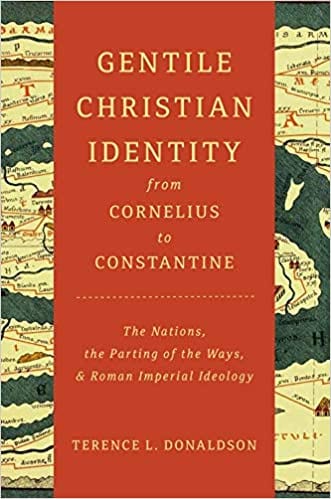Q. On p. 417 you point out that Justin seems to have been the first Christian who consistently used the term ethne to refer to Gentile Christians, even to the point of seeing the use of that term in the Greek OT as prophecies about Gentile Christians, not about possible adherents to the Jewish faith from the Gentile world. This could be seen as part of the takeover by Christians of Jewish Scriptures as meant ultimately for Christians and predicting the coming of Gentile Christians as the fulfillment of promises to Abraham, for example. Part and parcel of this was the conviction, as mentioned in the Petrine literature that the prophets were writing not only about Christ and his people, but even writing for them, though they were not totally aware of it at the time (1 Pet. 1.10-12). One has to admit that various aspects of Justin’s ‘hostile takeover’ of the Jewish Scriptures, if you want to call it that, in fact has a grounding in what the writers of the NT themselves claim at various points. Justin’s anti-Judaism is plain at various points, unlike the earlier writers in various respects. It is difficult to know how much of all this to take at face value and how much should be seen as a rhetorical attempt at apologetics and self-definition. In any case, the net effect of Justin’s efforts would seem to further the rising tide of both anti-Judaism and anti-Semitism in the growing, overwhelmingly Gentile, church. How as a practicing Christian yourself (p. 81 n. 122) do you come to grips with this often troubling data?
Particularly, how does this affect your view of the authority of the NT Scriptures themselves? I take your point that intramural debates between Jewish Christ followers and non-Christian Jews is one thing, and Gentile use of the earlier material to further cast shade on Judaism and their reading of Scripture is another, but still the issue can’t merely be ‘we Gentile Christians need to repent’— can it? Do we need to repent of believing that the NT itself is inspired by the same God who inspired the Hebrew Scriptures? I ask this in all seriousness because your book raises these sorts of larger issues.
A. These are complicated and often troubling questions indeed; in various ways I have been wrestling with them for a long time. It’s clear that in the story I trace in this book, scripture plays a central role. To the extent that the story raises disturbing questions, especially for Christians, these questions have to do in significant measure with scripture—its interpretation, to be sure, but also more fundamentally with its nature and character. Such questions first emerged for me as a student in my initial encounters with the adversus Judaeos tradition, and I’ve continued to wrestle with them ever since.
While the adversus Judaeos tradition dealt primarily with Old Testament material, it is readily apparent that this interpretive tradition stands in continuity with the “according to the scriptures” proclamation and polemic in the New Testament. Not that there weren’t differences, but many of the texts and arguments in the later tradition are found in NT material as well. My initial way of coming to terms with this placed emphasis on the intra muros character of (much of) the NT material; that is, it stemmed from a Jewish subgroup that was engaged in an in-house debate with the larger Jewish environment in which it lived. So even if some of the specific arguments and interpretations were the same, the fact that the adversus Judaeos tradition was directed “against the Jews” by gentile outsiders meant that there was a considerable difference between the two. While I still see this distinction as significant, it is nevertheless the case that the contemporary church stands in a direct line of descent from the gentile church in the pre-Constantinian period. In approaching the NT material, the gentile church of today can’t simply take refuge in the fact that troubling NT texts were originally written by Jewish Christ-believers.
As I became more familiar with the Judaism of the Second Temple period, however, and got a better sense of Jewish interpretation of scripture and expectations of eschatological redemption, I became increasingly aware of how the claims made by the early Jewish Christ-believers—e.g., that “what God promised to the ancestors he has fulfilled for us, their children, by raising Jesus”—would have seemed extravagant and puzzling to most Jews. The early Christian message both ascribed ultimate significance to Jesus and asserted that Christ’s person and work represented the goal and culmination of the story of Israel. Jewish expectations about the promised age of salvation did not seem to be consistent with the notion of a messiah who would suffer and die, who would do so as a means of bringing salvation, but who would be removed to heaven without having established the expected era of righteousness under the reign of God.













